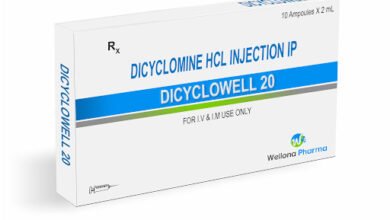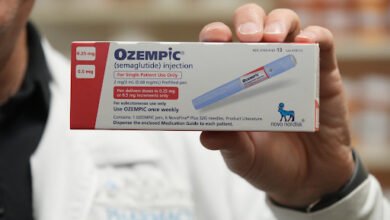The Facts About Cholesterol Medications

Almost 2 out of every 5 adults in the United States have high cholesterol, which can increase your risk of heart disease and stroke. This is dangerous for women and people assigned female at birth (AFAB) because heart disease is their number one cause of death.
Many people who have high cholesterol don’t know they do because there are no symptoms. Luckily, a simple blood test can check your cholesterol. And if it’s high, there are steps you can take that may help lower it, like taking cholesterol medications.
What are cholesterol medications?
Total cholesterol is made up of high-density lipoprotein (HDL), often called “good” cholesterol; low-density lipoprotein (LDL), often called “bad” cholesterol; and triglycerides.
You want your HDL to be high and your LDL, triglycerides and total cholesterol levels to be low (under 200 mg/dL).
Cholesterol medications are different types of drugs that can help lower LDL and triglyceride levels, which can help lower your total cholesterol as well. In some cases, the medications can also raise HDL. HDL helps absorb LDL so it can be flushed out of the body.
People who get their LDL levels low enough and keep them there have a 44% lower risk of having a heart attack or stroke.
The most common medications to treat high cholesterol are:
- Statins: Slow down how much cholesterol your liver produces while raising your HDL.
- Cholesterol absorption inhibitors: Prevent your intestine from absorbing cholesterol from your food.
Other drugs bind cholesterol, making it easier for your body to flush it out, or limit or prevent your liver from making it in the first place. These include:
- Bile acid sequestrants
- PCSK9 inhibitors
- Adenosine triphosphate-citrate lyase (ACL) inhibitors
People with high cholesterol because of a genetic disease called familial heterozygous hypercholesterolemia may have to take a combination of medications.
Who is a good candidate for cholesterol-lowering medicine?
You should talk to your healthcare provider (HCP) about cholesterol medication if you have:
- LDL levels of 190 mg/dL or higher
- A high risk of heart disease
- A previous history of heart attack or stroke
- Diabetes and LDL levels of 70 mg/dL or higher
How long does it take to lower cholesterol with medication?
Cholesterol-lowering medications should be taken every day around the same time unless your HCP says otherwise. You also need to follow instructions for your type of medication. For example, some must be taken on an empty stomach and others should be taken with food. Some statins come with a warning not to take an antacid at least two hours before taking the drug.
If you take your cholesterol medication the way you’re supposed to, it can take about four weeks for your cholesterol levels to drop. Since there are no symptoms of high cholesterol, you won’t feel whether your levels have gone down. You will need a follow-up blood test to check. If it didn’t work or the drop wasn’t enough, your HCP might prescribe a higher dose or a different medication.
It may take some trial and error to find the right drug, and not all medicines work the same for everyone.
Cholesterol medication risks
As with all drugs, some risks come with taking cholesterol-lowering medications. They may interact with other medications you already take, for example. They can also affect your liver, but this is rare. Regular blood tests while you take these drugs will monitor this and alert your HCP if there are any signs that your liver may be developing problems.
Other possible side effects of cholesterol medication include:
- Muscle and/or joint pain
- Increase in blood sugar levels
- Memory loss or confusion
- Nausea
- Diarrhea or constipation
- Headaches
- Upset stomach
- Bloating and/or gas
High cholesterol in women
Men and women often have different symptoms when they have a heart attack. For example, men typically feel pain in their chest and pressure. Women often have more subtle symptoms, like nausea or shortness of breath.
Read: Symptoms of Heart Attacks in Women >>
Because women often don’t present with typical heart attack symptoms, HCPs may overlook or dismiss what’s happening. So, it’s important to understand your heart health and your risk of a heart attack. Part of this is being aware of your cholesterol levels, taking your medication as prescribed by your doctor and following up to make sure the medication works.
Read: Why Don’t Women Get the Same Treatment for Heart Disease as Men? >>
Race and ethnicity also can play a role in cholesterol levels. For example, while white people have higher LDL levels compared to people of other races, people of South Asian descent tend to have lower levels of HDL than the general U.S. population. Lower HDL means less LDL is removed from the blood, which puts them at higher risk for heart disease.
Other reasons for high cholesterol
With some chronic diseases, people with lower levels of socioeconomic status and education are at higher risk. But for high cholesterol, research shows it’s often people with more income and higher education levels. But, no matter where you live, your income or your education level, lifestyle choices can affect cholesterol levels.
You can take some steps to help your body regulate LDL levels. These include:
- Eating a healthy diet that is low in saturated and trans fats
- Losing weight if you’re living with overweight or obesity
- Quitting smoking
- Limiting alcohol consumption
- Exercising to help raise HDL, which can help lower LDL
Questions to ask your HCP about medication for high cholesterol
If you are concerned about your cholesterol levels and treatment, here are some questions that you may want to ask your HCP:
- What cholesterol medication should I start with?
- What side effects should I watch for?
- What is my LDL goal after I start taking the medication?
- How often should I get blood tests to check my cholesterol levels?
- What is the next step if the medication doesn’t work?
- Should I have genetic testing to see if I have a cholesterol disorder?
- Should my family/children be tested?
This educational resource was created with support from Amgen, a HealthyWomen Corporate Advisory Council member.
From Your Site Articles
Related Articles Around the Web
Source link
#Facts #Cholesterol #Medications



